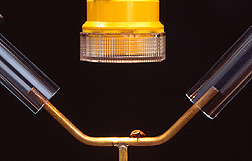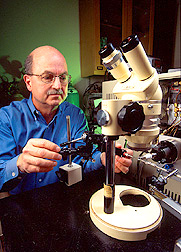The Nose KnowsHow pests zero-in on their favorite crops
|
|
 This Colorado potato beetle is being offered a choice between a chemical attractant and potato leaf aromas and is moving toward the attractant. (K8743-1) |
Ever wonder how insects find exactly what plant they want to eat? Entomologist Joseph C. Dickens has found the answer to that question—at least for one key potato pest. Because of his inquisitiveness about Colorado potato beetles, there's good news for growers: An attractant may not be far away.
For at least 73 years, scientists have been searching for a scent that attracts this yellow and black bug to solanaceous plants. Colorado potato beetles are the potato crop's most destructive insect pest, costing growers millions in chemical control and crop losses each year. By placing tiny electrodes on the tips of their antennae and monitoring their sensitivity, Dickens, who is with ARS' Vegetable Laboratory in Beltsville, Maryland, discovered several chemical scents that attract the pests. He exposed the insects to different potato leaf aromas and allowed them to choose those they preferred. |
 A gas chromatograph (GC) is used to identify individual scents emitted from potato foliage. Above, entomologist Joseph Dickens positions a Colorado potato beetle antenna in front of a GC outlet to find out which scents the insect detects. (K8742-1) |
When Dickens offered the beetles a choice between one of the attractive scents and potato foliage, the beetles were terribly confused, he says, and they eventually responded randomly.
"We separated odors from both normal and wounded plants using a gas chromatograph, which separates chemical mixtures into components," says Dickens. "This allowed us to stimulate the beetles' antennae with the individual components to see which they could smell. We monitored the insects' responses to both real and synthetic scents. So far, we've tested 16 different synthetic chemical blends, and we hope to develop and test more." During summer 1998, Dickens was surprised to find in a preliminary field test that the beetles were captured with a synthetic lure containing a mixture of a few of these compounds. He says no one had ever caught a Colorado potato beetle with a synthetic lure before. He and his colleagues have identified at least five different synthetic blends that are attractive to the insects in laboratory tests and may work in the field as well. "From this research, naturally occurring chemical signals could be used to monitor and control pest populations," Dickens says. He is also investigating how chemical scents, which are emitted when the beetles chew on plants, might help attract potato beetle predators. Two predators of interest are spined soldier bugs and two-spotted stink bugs. Dickens has already identified chemical blends that are attractive to both. Down the road, these chemical blends could be used as part of a biological control effort using natural enemies to control Colorado potato beetles, thus reducing reliance on pesticides. Growers frequently apply insecticides to control the critter, but it has armed itself with resistance to many chemicals. "Our ultimate goal," says Dickens, "is to develop a synthetic attractant to combine with a toxin or pathogen in a bait, which could be used to control this pest." —By Tara Weaver-Missick, Agricultural Research Service Information Staff. This research is part of Crop and Commodity Pest Biology, Control, and Quarantine (#304), an ARS National Program described on the World Wide Web at http://www.nps.ars.usda.gov/programs/cppvs.htm. Joseph C. Dickens is at the USDA-ARS Vegetable Laboratory, Bldg. 010A, Room 112, 10300 Baltimore Ave., Beltsville, MD 20705-5374; phone (301) 504-8957, fax (301) 504-5555. |
|
"The Nose Knows" was published in the February 2000 issue of Agricultural Research magazine.
|
|






